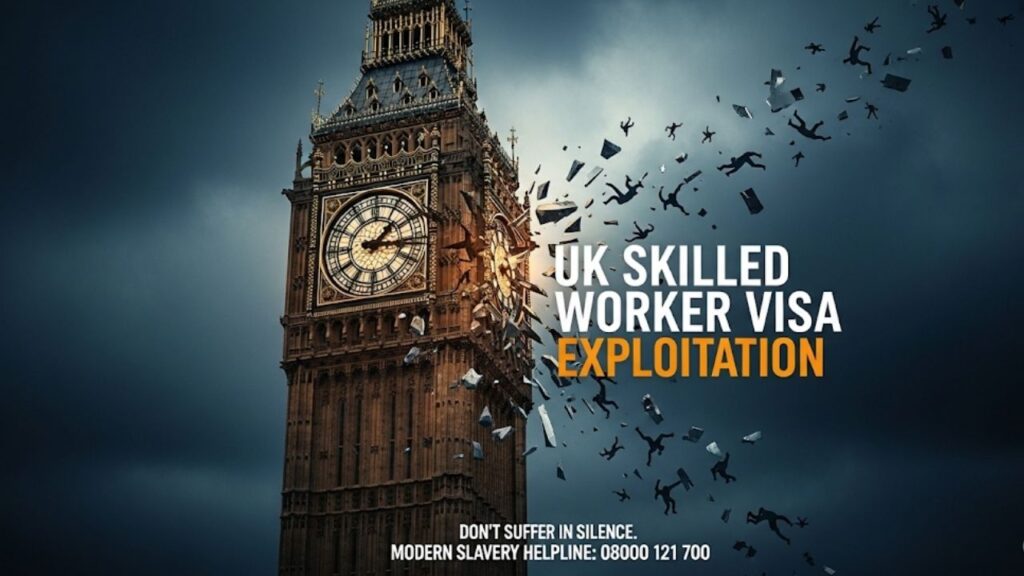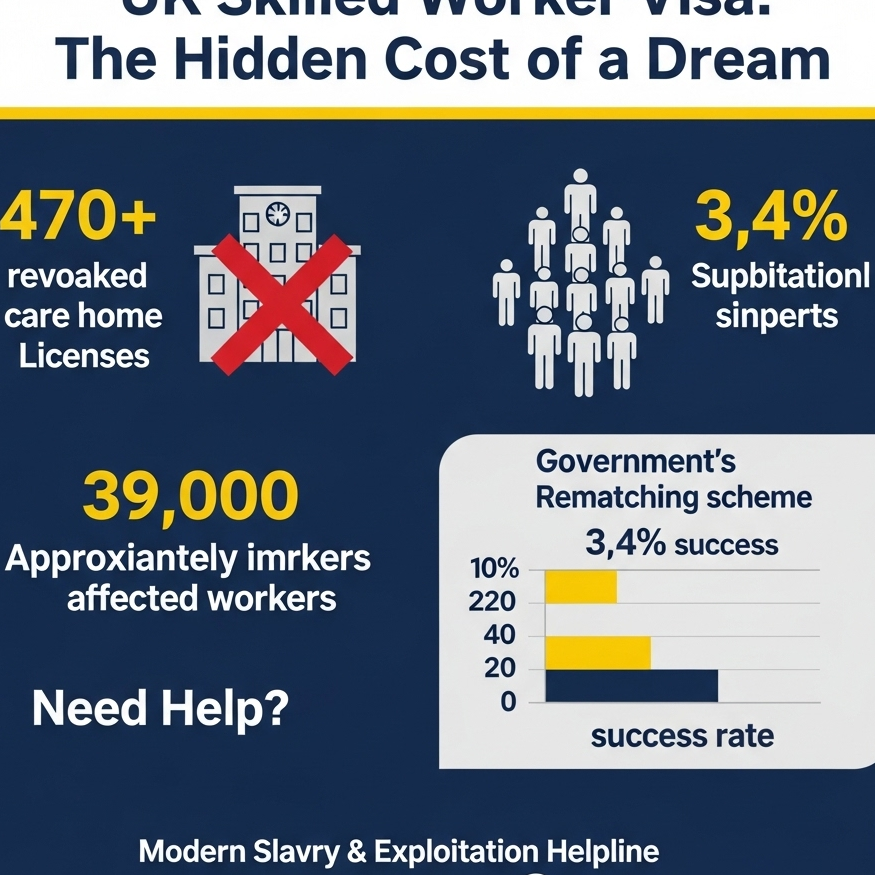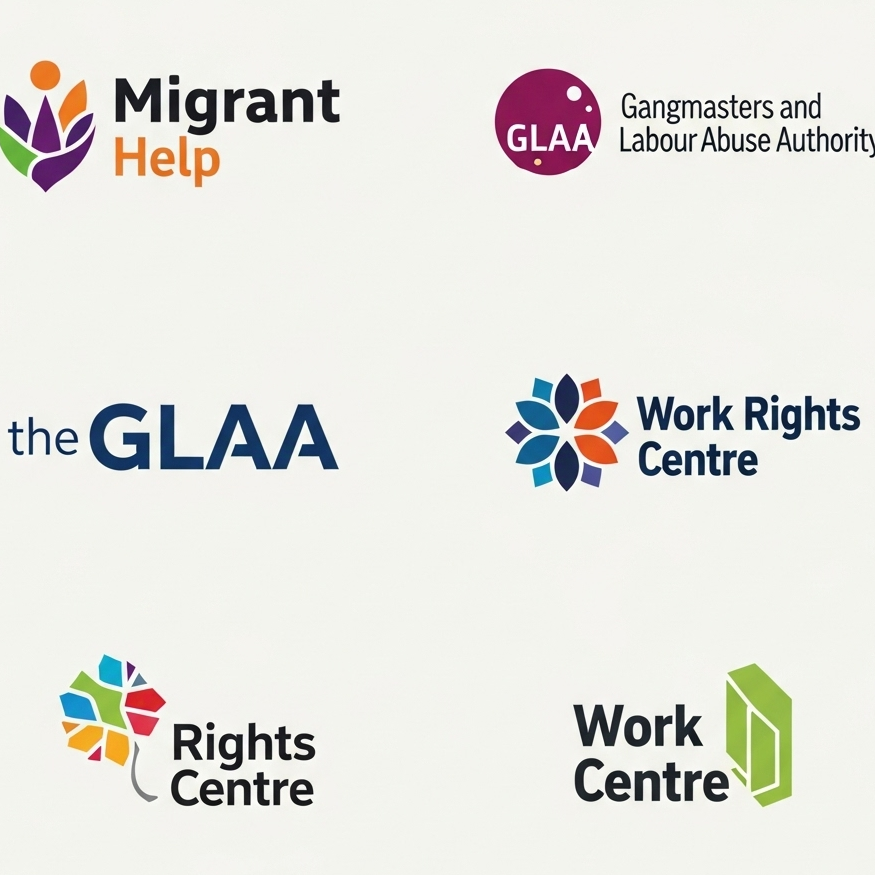The UK Skilled Worker Visa exploitation crisis is a harsh reality for thousands who come to the Britain seeking professional growth and a new life. While this visa pathway offers a golden opportunity for many, a troubling pattern of abuse has emerged, leaving vulnerable individuals trapped in cycles of debt and fear. Recent reports have blown the lid off systemic failures, particularly within the social care sector, revealing how easily the dream can curdle into a nightmare. This article is your guide to understanding these risks, recognizing the warning signs, and knowing your rights. We’re here to provide the clear, authoritative, and encouraging information you need to navigate the process safely and successfully.

The journey to working in the UK should be one of excitement and opportunity, not fear. I’ve spoken with countless applicants over the years, and the eagerness to build a better future is always palpable. However, that very hope can be a vulnerability. Let’s arm you with knowledge, so your UK story is one of success, not survival.
The Unfolding Crisis: What Recent Reports Reveal
Recent headlines have been stark, painting a grim picture of the realities faced by some migrant workers. A July 2025 report from the UK’s Public Accounts Committee (PAC) delivered a particularly damning verdict, stating the government’s response to the exploitation of migrant workers has been “slow and ineffective.”2
The committee found widespread evidence of individuals suffering from:
- Debt bondage, where workers are forced to pay off huge, often illegally inflated, recruitment fees.
- Excessive working hours for little or no pay.
- Deplorable and exploitative living and working conditions.
The core of the problem lies in the sponsorship model itself. Your right to remain in the UK is tied directly to your employer, creating a dangerous power imbalance. This dependency, as the PAC report highlights, makes workers “vulnerable to exploitation,” as they fear that reporting abuse could lead to the revocation of their visa and deportation.
The situation escalated when the visa route was expanded in 2022 to address critical staff shortages in the social care sector. While well-intentioned, this rapid expansion occurred without adequate safeguards. Between July 2022 and the end of 2024, the Home Office revoked over 470 sponsor licences in the care sector due to abuse, affecting tens of thousands of workers who had been brought to the UK under these now-discredited sponsors.

Why Is This Happening? Uncovering the Policy Gaps
Understanding the root causes of UK Skilled Worker Visa exploitation is crucial for both current visa holders and future applicants. The system’s vulnerabilities stem from several critical policy and enforcement gaps.
The “Tied” Visa System
The most significant factor is the sponsorship system. When your immigration status is tethered to a single employer, the stakes of speaking out against mistreatment are incredibly high. Unscrupulous employers can exploit this fear, knowing that their employees are unlikely to report them to the authorities. Charities and advocacy groups like the Work Rights Centre have unequivocally found that this principle of sponsorship is “inherently unsafe for workers.”
Inadequate Vetting and Oversight
The rapid expansion of the visa scheme, especially in the care sector, led to a surge in new sponsors. Unfortunately, the vetting process for these employers was not always robust enough to weed out those looking to profit from exploitation. The National Audit Office (NAO) concluded in a March 2025 report that the Home Office had made changes to the visa route “without a detailed understanding of potential impacts across different sectors and regions.”
The Failure of Support Systems
When a sponsor’s licence is revoked, their employees are left in a precarious position. They typically have just 60 days to find a new, approved sponsor or face leaving the country. In response, the government established regional “hubs” to help match these displaced workers with legitimate employers.
However, the results have been deeply concerning. According to data obtained by the Work Rights Centre, of the more than 28,000 migrant care workers referred to these hubs between May 2024 and April 2025, fewer than 4% reported finding new employment through the system. This leaves a massive support gap, pushing many into undocumented work or destitution.
Red Flags: How to Spot and Avoid Exploitation
Being informed is your first line of defence. Whether you are considering applying for a Skilled Worker Visa or are already in the UK, you must be vigilant.
Be wary of:
- Charging of Illegal Recruitment Fees: A legitimate UK employer will never charge you a fee for a job. The costs of sponsorship should be borne by them. If an agent or employer demands thousands of pounds for your Certificate of Sponsorship (CoS), this is a major red flag for debt bondage.
- Vague or Misleading Job Offers: Your contract should clearly state your role, salary, hours, and place of work. Be suspicious of any employer who is evasive about these details or if the reality upon arrival is drastically different from what was promised.
- Withholding of Documents: An employer has no right to hold your passport, visa documents, or other personal identification. This is a common tactic used to control and intimidate workers.
- Unfair Salary Deductions: While deductions for tax, National Insurance, and pensions are normal, your employer should not be making unexplained or excessive deductions for accommodation, food, or “administrative costs.”
- Restrictions on Your Freedom: Any attempt to restrict your movement, control who you speak to, or prevent you from leaving your job is a sign of modern slavery.
Know Your Rights and Where to Find Help
If you believe you are a victim of UK Skilled Worker Visa exploitation, please know that you are not alone and help is available. It is crucial to act, even if you are afraid.
Your Fundamental Rights
As a Skilled Worker Visa holder in the UK, you have rights. These include:
- The right to be paid at least the national minimum wage.
- The right to a written contract of employment.
- The right to paid holiday and statutory sick pay.
- Protection from discrimination and unsafe working conditions.
Losing your sponsored job does not automatically mean you must leave the UK immediately. You have a 60-day grace period to find a new sponsor or switch to a different visa category if you are eligible.
Reporting Abuse and Getting Support
If you are in immediate danger, call 999 for the police.
For advice and to report concerns about modern slavery, you can contact the Modern Slavery & Exploitation Helpline at 08000 121 700. It is free, confidential, and available 24/7.
Several organizations provide free, confidential advice and support to migrant workers:
- The Work Rights Centre: Offers free legal advice and support on employment rights.
- Migrant Help: Provides support for vulnerable migrants, including victims of exploitation.
- The Gangmasters and Labour Abuse Authority (GLAA): Investigates labour exploitation across all sectors.12 You can report concerns to them directly.
- Citizens Advice: Offers free, confidential advice on a wide range of issues, including work and immigration.

The UK government also provides a list of community support organizations for vulnerable citizens on its official website.
The UK Skilled Worker Visa remains a vital and valuable route for thousands of skilled professionals from around the world. It fuels key sectors of the British economy and offers incredible opportunities for personal and professional development. However, the evidence is clear: the system has critical flaws that have enabled the exploitation of the very people it aims to attract.
As an applicant or a current visa holder, your greatest asset is awareness. Understand the process, be vigilant against the red flags of exploitation, and know your rights. The promise of working in the UK is real, but it must be pursued with caution and knowledge. For its part, the UK government must heed the urgent calls for reform—to create a system that is not only efficient for employers but is, first and foremost, safe and just for every single worker who places their trust in it.
Navigating the Maze: Your Guide to the UK’s New Visa and Settlement Rule Changes in 2025
FAQs
Q1: What should I do if my UK employer is not paying me the salary stated on my Certificate of Sponsorship (CoS)?
This is a breach of your sponsorship conditions. You should seek confidential advice immediately from an organization like Citizens Advice or the Work Rights Centre. You can also report your employer to UK Visas and Immigration (UKVI), as they are violating their sponsor duties.
Q2: Can I change my employer if I am on a Skilled Worker Visa?
Yes, you can. However, you must first find a new job with an employer who is a licensed sponsor. You will then need to apply for a new Skilled worker visa with a new CoS from your new employer before you can start the new job. You cannot simply resign and start working for someone else.
Q3: My employer is threatening to have me deported if I complain about my working conditions. What can I do?
This is a form of intimidation and is illegal. Your employer has no power to deport you. Only the Home Office can make such decisions. Contact the Modern Slavery & Exploitation Helpline or a trade union for immediate, confidential support. These threats are a clear sign of an exploitative employer.










